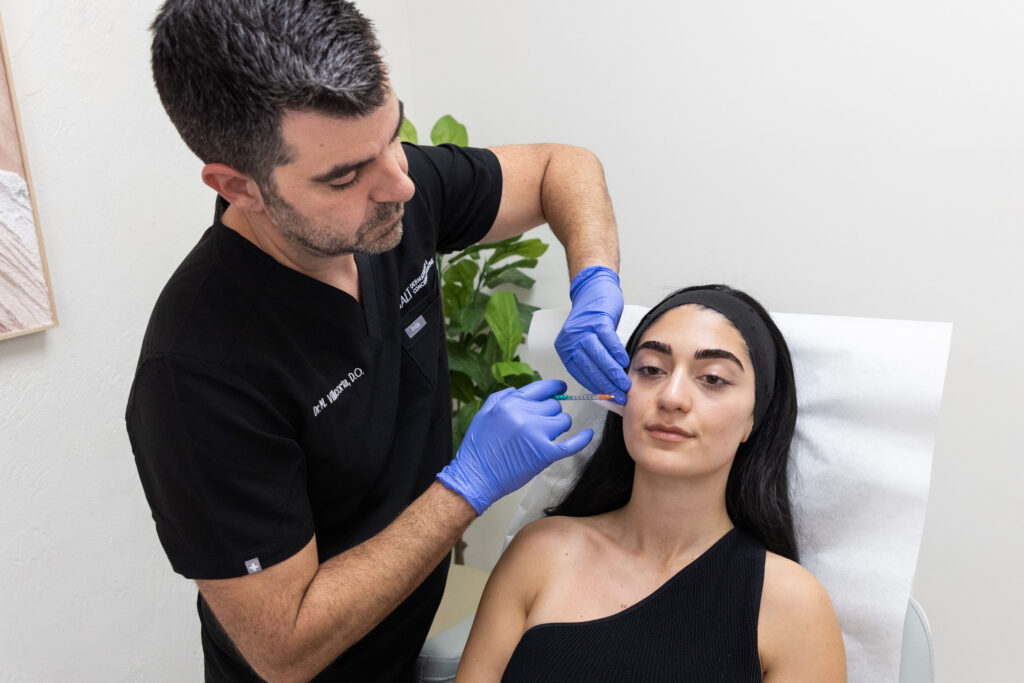
Many myths and have surfaced throughout the years when it comes to eating for clear skin.
“You must avoid fatty foods.”
“No dairy. No exceptions.”
“Steer clear of sugar.”
However, there has been an ongoing debate as these beliefs surface in the medical world. And while it’s true that some claims are simply fads, recent research has found that diet does impact skin clarity, acne, and overall tone.
A recent study published by JAMA Dermatology indicates the connection that consuming certain foods has with the development of adult acne. The study observed 24,542 French adults who were given a questionnaire, which categorized them into one of three groups. The groups were structured as such:
- Participants who have never suffered from acne
- Participants who have historically (but not presently) suffered from acne
- Participants who are currently suffering from acne
Participants kept a 24-hour record of their diet each day for a 6-month trial, recording each meal. The study had found a possible correlation between the consumption of milk, sugary beverages, and fatty processed foods with adult acne. However, further large-scale studies are warranted to investigate more closely the association between diet and adult acne.
Your Diet and Your Skin. How Does Diet Effect Acne?
Acne develops as dead skin cells, excess sebum, and bacteria clog pores. Clogged pores are also a sign of inflammation in the body, in which certain foods may perpetuate or worsen. This is especially true for adolescents who are transitioning through puberty, as well as adults suffering from autoimmune disorders, and women experiencing perimenopause and menopause symptoms.
A key to understanding how to lower your risk for diet-related adult acne is to understand the relationship between an anti-inflammatory diet and skin clarity. When there is less inflammation in the body, less inflammation will appear through the skin, the glandular systems, as well as the gut; which is strongly linked to the health of your skin.
High-Inflammatory Foods to Avoid for Acne-Prone Skin.
Each individual will have unique dietary needs, and so it is always important to discuss nutrition tips for clear skin with a board-certified dermatologist. However, some foods are known to cause heightened inflammation when consumed regularly. These foods may be found in the following groups:
- Processed dairy
- High glycemic-index foods (cakes, pastries, enriched bread, and pasta)
- Refined sugars
- Caffeine
There is no known evidence that fatty foods are directly linked to acne. Since acne is the result of overactive sebaceous glands, fats, and oils from the foods you consume would not interfere with sebaceous oil production. Some fats, especially those high in Omega 3’s, may provide anti-inflammatory benefits to help you maintain a balanced, clear complexion.
Anti-inflammatory Foods to Increase for Clear Skin.
As discussed, Omega-3 fatty acids may help to reduce inflammation and prevent adult acne. Common sources of dietary Omega-3’s include:
- Fatty fish (salmon, mackerel)
- Nuts (walnuts, brazil nuts, almonds)
- Flaxseeds and chia seeds
- Grass-fed meats
Other nutrient-dense foods will be extremely beneficial for keeping the skin clear, as they contain all the vital nutrients, minerals, and vitamins the skin needs to remain balanced. These would include foods high in antioxidants such as
- Dark-pigmented fruits and vegetables (pomegranates, beetroot, berries)
- Beans and legumes (navy beans, lentils, chickpeas)
- Dried fruits
A diet high in fiber will also aid the body in fighting inflammation, as fiber helps to slow digestion and stabilize blood glucose levels.
Skincare Tips to Avoid Acne.
A consistent skincare routine, in combination with a healthy diet and routine appointments with your dermatologist, plays an important role in maintaining clear, healthy skin.
Your dermatologist can adequately assess your skin concerns, and discuss your current skincare regime and diet, providing feedback and suggestions customized just for you.
Some general practices to maintain healthy, clear skin will include:
- Cleansing the skin deeply each day, especially after exercise
- Using gentle, dermatologist-recommended skincare products
- Avoiding scratching and picking inflamed skin
- Avoiding excessive exposure to the sun
Closely monitoring your stress levels is another important lifestyle factor to consider. Stress is known to increase levels of cortisol and androgens in the body. These hormones stimulate the sebaceous glands, which in turn will produce more oil, potentially clogging your pores.
There is No “One-Size Fits All.”
Research remains inconclusive regarding the anti-acne diet. However, reducing the consumption of inflammatory foods and adhering to a proper skincare routine will largely benefit your skin and overall health.
Since everyone’s skin is incredibly unique, the trigger for your acne will be too.
Dietary changes alone won’t be enough to clear acne. At Galt Dermatology, our board-certified dermatologists take the time to sit down with you and go in-depth to discuss medical-grade facials, skin care products, treatments, and prescriptions that will work best to support your skin clearing journey. Book an appointment today, to come and see us! Same-day and same-week appointments are available for your convenience.


